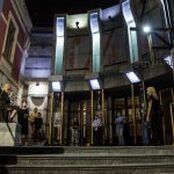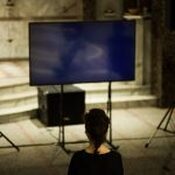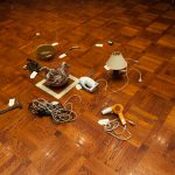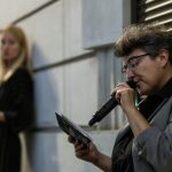ЛОУНЛИ ПЛЕНЕТ
|
Lonelly Plllenet is a play of an immersive character, which is performed in open and closed spaces, around and in the theater building, deliberately avoiding the classic stage space, that is, the stage itself. Through the collage structure of five authorial and performing voices, which intertwine and permeate each other, the artists lead a properly distanced audience on a tourist tour through both sides of the coin of utopia and dystopia of our (theatrical) everyday life.
The beginning of this year was marked by an epidemic of coronavirus. It is a global phenomenon, so are the issues and uncertainties associated with it. Our common public and shared spaces, including theaters, have become places of confinement and fear, and none have been spared. The crown also showed that it is possible for the whole world and the system to just stop, but also that the mechanism of self-preservation of modern capitalism is stronger than such a break. We spend our days in a mixture of feelings of fear, apathy, cynicism, euphoria, physical activities, going through constant emotional roller coasters. Like me, the world - the world - seems to be swaying between the restoration of order in a more brutal form - fascist dystopia, and the revitalization of socialist ideas about resource sharing, a strong public sector and solidarity - socialist reality - utopia.
Theaters were the first to close their doors at the beginning of the epidemic, given the impossibility of gathering a larger number of people in public space. Again, the so-called social distancing should not and should not mean the abolition of the public sphere, nor the practice of performance. If, as artists, we have had to think in the market before and offer ourselves on the labor market, constantly devising new projects, with the crown, our precarious position has been strengthened. The authors are aware of the irony inherited from this project and will consciously try to transform it into its opposite - an authentic non-cynical political thinking of the future. Even before the epidemic, the world was unjust, wounded and unbearable. The epidemic of the virus increases the visibility of the corpus of modern inequalities we live in, and violently provokes our imagination to operate between imagining a better world and the darkness of the future filled with hunger, surveillance and fear.
Through five authorial voices, we will try to guide the audience through the landscapes and paths of those transformed futures that await us. Lonely Planet presents a slalom through the possible utopias and dystopia of our cities and our intimacies and focuses on several questions: How do we use public space to transform our individual issues and needs into social ones? How do we think about the world before and after the threat that came to remain, in various, even more dangerous forms? How do we conduct the most elementary interactions with other people, objects, beings while we are in a position of absolute uncertainty about what kind of life awaits us all tomorrow? This play reflects on the world of the first half of 2020, while at the same time trying to rethink the forms of theater that can take place despite the virus, and consequently, the potential forms of community in the public space of the future.





